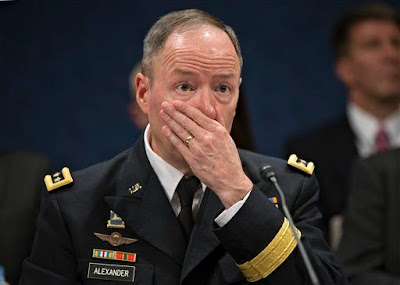During a hearing held by the House intelligence committee the director of
the NSA General Keith Alexander was bombarded with powder puff questions by
House committee members who saw their mission as bolstering the NSA against
criticism and discrediting Edward Snowden, the NSA whistle blower who apologists
try and put down as everything from a high school drop out to ignorantly ( as
far as the law and definition is concerned) a traitor.
During the questioning Alexander made claims regarding the success of the
NSA spying program with regards to foiled terrorist plots that are at best
dubious.
First, the over all claim was that the NSA collecting phone records and
Internet communications of hundreds of millions of Americans over the last few
years foiled 50 terrorist plots. Of those 50 it turns out only 10 were in the
United States. And while Alexander offered no details on how these 10 were
foiled by the NSA collection of everyone's phone records, at least two should be
met with extreme skepticism. And those two happen to be the most
significant.
Alexander and other witnesses claimed that a plot to blow up the New York
Stock Exchange and an attack on the New York subway system was foiled by these
mass collections of phone records. Both claims are doubtful.
It's indisputable that New York is probably the number one terrorist target in America, the place where terrorists would most like to hit. They haven't since Sept 11, 2001.
Credit for New York City not having had one single terrorist attack since
911 goes to Ray Kelly, New York City police commissioner, the NYPD
anti-terrorism task force, Mayor Bloomberg, and the New York office of the FBI.
The fact that there has been no successful terrorist attack on New York
City in the 12 years since Sept 11, and that this predates the NSA
domestic collection of Americans phone records by nine years, reality flies in the
face of the NSA claims. And that this fact was never brought up by members of the
committee made them sound more like actors in an NSA promotional video than members
of congress doing oversight.
The second reason to doubt NSA claims is that since they were made neither New York mayor Mike Bloomberg, nor commissioner Ray Kelly have said
a word supporting the claims that it was the NSA secret collection of
American's phone records that were responsible for preventing those
attacks.
Given the national and international controversy over Snowden's disclosures
and Obama himself trying to justify the program and calling for dialogue, had those
programs been directly responsible for foiling two major attacks on New York
City, Mayor Bloomberg and Commissioner Kelly surely would have publicly
confirmed it. And supported it.
They haven't.
Their silence speaks louder than Rep. Peter King, Dianne Feinstein, Mike Rogers, Obama and others who have defended the program as essential to keeping Americans safe. And speaks louder than General Alexander and witnesses trying to justify the program while at the same time admitting that no one can point to single plot that was foiled exclusively because of the NSA collection of phone records and internet communications.of hundreds of millions of Americans.
Their silence speaks louder than Rep. Peter King, Dianne Feinstein, Mike Rogers, Obama and others who have defended the program as essential to keeping Americans safe. And speaks louder than General Alexander and witnesses trying to justify the program while at the same time admitting that no one can point to single plot that was foiled exclusively because of the NSA collection of phone records and internet communications.of hundreds of millions of Americans.
Add Obama's preposterous statement to Charlie Rose in a PBS
interview when asked if it wouldn't be better to have more
transparency in the process to which Obama replied," We have transparency. That's what the FISA
court is for", there is all the more reason to question the validity of the program. The
FISA court is a top secret classified
proceeding where there is no public transparency at all. They operate in complete secrecy. Which is why the FISA
order which Snowden gave to the Guardian authorizing the mass phone record
collection is marked " Top Secret".
That there is more than a little reason to question the entire program and
the efficiency of the congress to exercise proper oversight came when a witness defending the program
made the point that even if collecting phone records and internet communications
of hundreds of millions of Americans saved even one life, it was worth
it.
Everyone on the committee agreed that a program that saves the life of even one American is worth it. These are the same people who are on the record as opposing background checks for people who want to buy a gun.





No comments:
Post a Comment